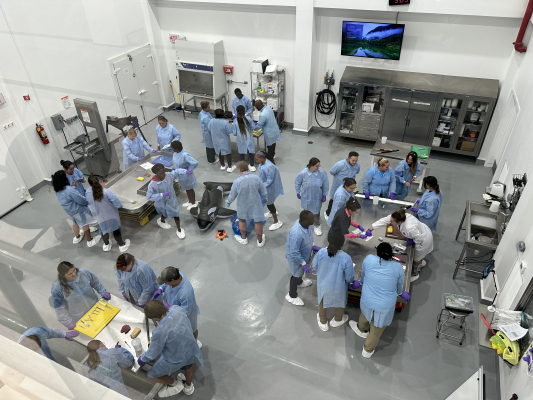Successful delivery of strandings response training
across the Caribbean region
The IWC Strandings Initiative has successfully delivered an extensive Caribbean training project in partnership with CARI’MAM, the Caribbean Marine Mammals Preservation Network.
Twelve Caribbean island nations participated in the two-day training workshops, which were held in four different locations and conducted in English, Dutch, French and Spanish as appropriate. Sessions began with classroom discussions before moving to beaches and labs for practical training in first aid and refloating of live animals, and international best practice for collecting data and samples from carcasses.
Strandings response is affected by many factors such as accessibility, logistics, resources and availability of equipment. A modular design meant each workshop was tailored to meet the unique circumstances of that region. Trainees practiced using a strandings response kit which was then left at each location for future use.
Long-term capacity building is a central aim of the IWC Strandings Initiative. As well as training in response techniques and tools it’s important to build the resilience and confidence needed to create an empowered, sustainable local response network.
The Caribbean workshops introduced trainees to the IWC Expert Panel on Strandings, a group of globally recognised experts who offer real-time guidance and support to those dealing with stranded animals on coastlines all over the world. Workshops also aim to establish links between response teams and other vital components of any response effort, ranging from animal health labs to local emergency services.
The training took place in October and November. It was conducted by the IWC Strandings Initiative in partnership with CARI’MAM, the Caribbean Marine Mammals Preservation Network, as part of CAMAC (Caribbean Marine Megafauna and Anthropogenic Activities), a Caribbean co-operation project.
Following the series of workshops, the IWC Strandings Coordinator and Chair of the Strandings Expert Panel attended a concluding workshop on Interactions Between Human Activities and Marine Megafauna of the Caribbean : Progress Made Through the CAMAC Project and Potential for Future Actions. This took place in Nassau, Bahamas and the IWC Strandings Team jointly presented an appraisal of the training toolkit which had been developed by CAMAC. The team also presented feedback from participants in the earlier series of workshops, and recommendations for Phase II of the project.
Learn more about cetacean stranding and the IWC Strandings Initiative.

